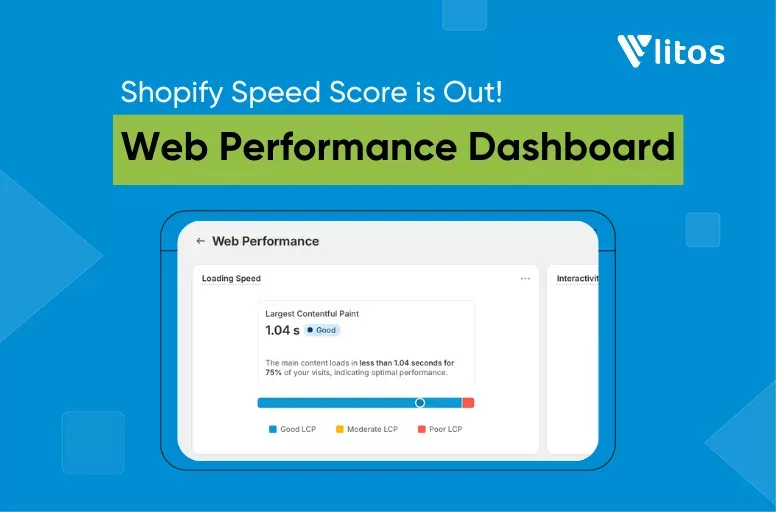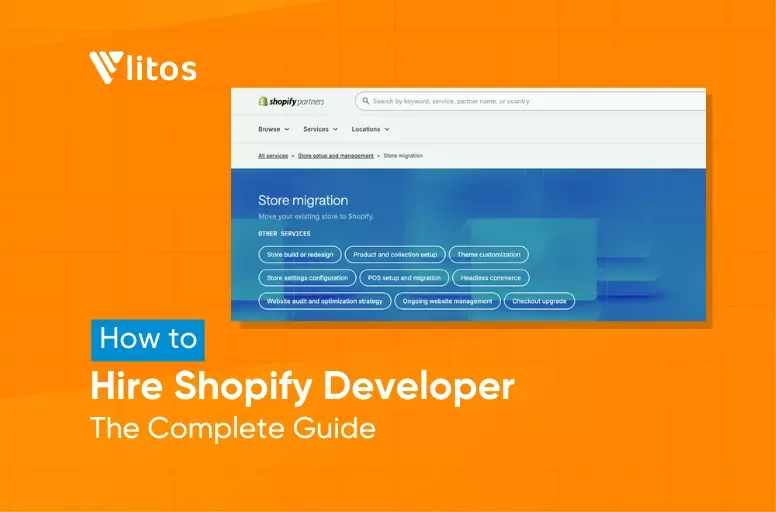
How to Find and Hire Shopify Developer in 2025
Hiring a developer is often the turning point between a basic Shopify store and a high-performing, fully customized eCommerce experience. While Shopify offers great built-in tools, businesses quickly find limitations when they need unique designs, custom features, third-party integrations, or long-term technical support.
That’s where a professional comes in. If you’re looking to hire Shopify developer in 2025, this guide will help you:
- Understand the key benefits of hiring a developer
- Explore the typical costs involved
- Learn how to find and evaluate the right Shopify talent
- Discover trusted places to source developers
Let’s get started!
Why Should You Hire Shopify Developer?
Whether you’re new to Shopify, just migrated from another platform, or already running a store, it’s common to hit a point where the platform’s built-in tools aren’t enough. Maybe you want a unique design, need advanced features, or simply don’t feel confident handling technical tasks yourself.
That’s when it makes sense to hire Shopify developer—someone who can take your ideas and turn them into a fully functional, professional, and optimized online store.
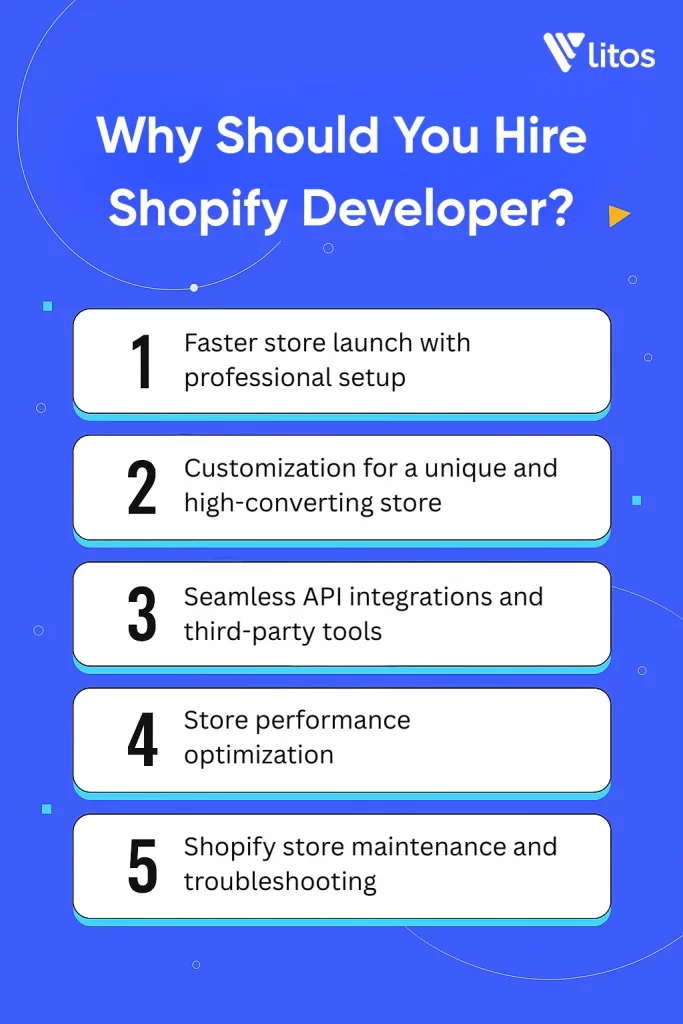
1. Faster store launch with professional setup
Setting up a Shopify store might look easy, but doing it right takes time and experience. A developer knows the entire process from theme setup and product organization to configuring taxes, shipping, payment gateways, and domain settings. Instead of spending weeks figuring it out, you can launch in days with everything working smoothly from the start.
2. Customization for a unique and high-converting store
Free themes are a good starting point, but they’re used by thousands of other stores. If you want your brand to stand out and guide visitors toward purchases, you’ll likely need more customization than what standard settings allow. A developer can tweak layouts, adjust styling, create custom features, and build tailored experiences that improve user flow and increase your conversion rate.
3. Seamless API integrations and third-party tools
Growing stores often need to connect Shopify with other platforms like email marketing apps (e.g., Klaviyo), CRMs (e.g., HubSpot), ERPs, or fulfillment solutions. When you hire Shopify developer, they will ensure these tools work together properly through API integrations, automating workflows and saving you hours of manual work each week.
4. Store performance optimization
Store performance goes beyond just fast loading times. It’s about how well your Shopify store drives sales and handles growth. A developer can help improve both technical performance and key business metrics by optimizing your store setup.
This may include:
- Improving page speed and responsiveness
- Setting up features that increase average order value and units per transaction
- Optimizing product display and filtering to improve sell-through rate
- Streamlining checkout to reduce drop-offs and boost conversion rates
- Integrating analytics tools to track customer lifetime value, sales per employee, and year-over-year growth
A well-optimized store not only loads fast, but it also supports better decision-making and maximizes revenue opportunities over time.
5. Shopify store maintenance and troubleshooting
Even after your store is live, things can go wrong, apps may conflict, features might stop working after updates, or customers might encounter checkout issues. A developer helps maintain your store over time, fix bugs, roll out updates, and prevent technical issues from affecting your business.
How Much Does It Cost to Hire Shopify Developer in 2025?
The cost to hire a Shopify developer in 2025 can vary widely depending on a few key factors: the complexity of your project, the developer’s experience level, and whether you’re working with a freelancer or a professional agency.
Based on current listings on the Shopify Experts Marketplace, Upwork, and agency profiles on Clutch.co, here’s a general breakdown:
- Freelancers typically charge between $25 to $100+ per hour. Junior developers or offshore freelancers (e.g. from India, Vietnam, Eastern Europe) tend to charge on the lower end, while experienced Shopify Experts based in the US, UK, or Australia charge more.
- Agencies usually price by project. A basic Shopify store setup may start around $1,500–$3,000, while advanced custom builds (custom themes, app integrations, Shopify Plus features) can range from $5,000 to $15,000+.
- Maintenance or retainer plans are also common, especially for brands that want long-term support. These can range from $300 to $1,500+ per month, depending on the scope.
If you have a small task like fixing a layout issue or installing an app hourly pricing is ideal. For full website builds, migrations, or ongoing development work, project-based pricing or retainers make more sense, offering better value and scope control.
Tip: Don’t just go for the cheapest option. Prioritize developers who understand your goals, communicate clearly, and deliver long-term value. A well-executed Shopify store will pay for itself in terms of performance, user experience, and fewer issues down the line.
Need a reliable quote? Litos.io offers custom Shopify development services tailored to your budget and business needs.
How to Hire the Right Shopify Developer
Hiring the right Shopify developer is more than just picking someone from a list of experts. To ensure your project runs smoothly and delivers results, let’s take a step-by-step approach together!
1. Define your project requirements
Before you start looking, get clear on what you need:
- Are you building a new Shopify store from scratch?
- Do you need to customize an existing theme, add specific features, or connect third-party tools like email platforms or inventory systems?
The more detailed your requirements, the easier it will be to find a developer who has the right skills for your project. For example: “I need a fully custom Shopify theme with a branded homepage layout, dynamic product filtering on collection pages, and a custom-designed product detail page.”
2. Set your budget and timeline
Once your project requirements are clear, the next step is to define how much you’re able to invest and when you expect the work to be completed. Your budget and timeline will directly impact the type of professional you can work with. Whether it’s a freelancer, a full-service agency, or you’re planning to hire Shopify developer through the Experts Marketplace.
Keep in mind: tight deadlines or complex features may cost more. For example, a simple theme adjustment or minor customization might cost a few hundred dollars, while a full custom store build with advanced features could range from $5,000 to $15,000 or more.
If you’re unsure about what your budget should be, you can request quotes from multiple developers and compare not just the pricing but also the value they provide. A lower quote may look appealing, but make sure it includes all the functionality and quality you’re expecting.
3. Research and shortlist candidates or agencies
At this stage, you can use platforms like the Shopify Experts Marketplace, Upwork, or Clutch to find developers with strong reviews and relevant experience. Also, be sure to ask for recommendations from peers if you can.
Look for developers with experience in:
- Liquid (Shopify’s templating language)
- HTML/CSS and JavaScript
- Shopify APIs and app integration
- Responsive UX/UI design
- SEO best practices
- Shopify Plus or Headless Commerce (if needed)
4. Review portfolios and case studies
It’s important to ensure the developer has the right technical background. Don’t just go by star ratings. Review past work preferably projects similar to yours. You can check live Shopify stores they’ve built, how they perform, and how custom or polished they feel.
For example, if you’re building a more complex store such as a Shopify Plus or headless setup choose someone with specific experience in those areas.
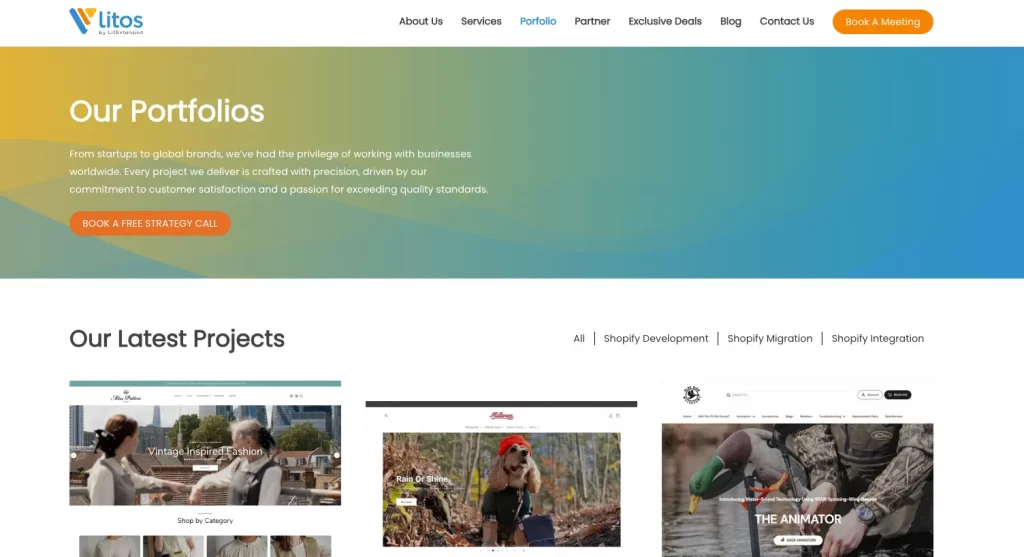
A strong portfolio shows not just design skills but also how the developer solves problems, builds functionality, and delivers user-friendly experiences.
5. Interview and assess fit
A short discussion can clarify working style, communication methods, and expectations. This time, you can optimize it by asking how they would approach your project, how they communicate during development, and what tools they use for collaboration or project management. Our recommendation for you is to pay attention to how well they understand your goals and explain their process.
6. Finalize terms and start the project
Before the project begins, you should clearly document the scope of work, timeline, pricing, payment terms, and what’s included in terms of revisions and post-launch support. Having everything in writing protects both sides and reduces the risk of confusion or delays later on.
Where to Find Reliable Shopify Developers?
Once you’ve defined your needs and know how to hire the right Shopify developer, the next step is to choose where to look. There are several trusted places where you can find qualified developers, each with its own pros and cons.
1. Shopify Experts marketplace
Shopify Experts marketplace is Shopify’s official directory of vetted developers and agencies. You can filter by service type, budget, and location.
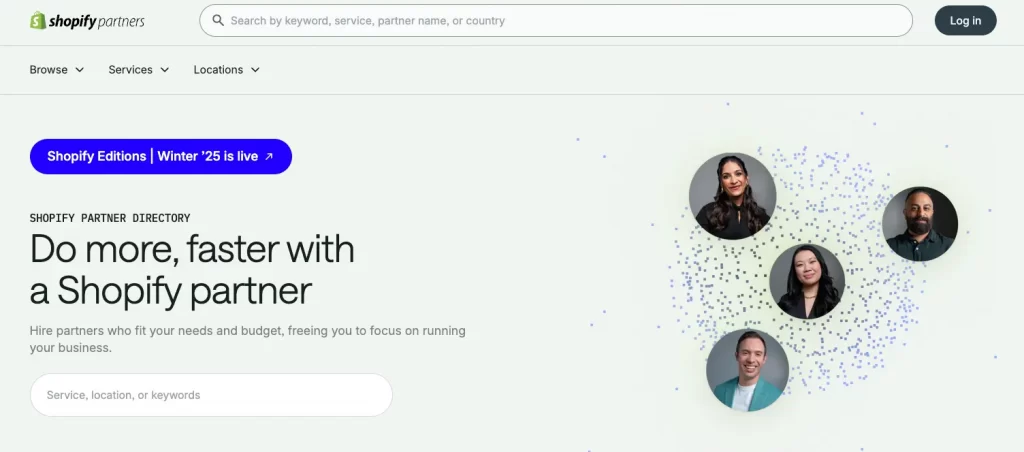
Profiles often include portfolios, client reviews, and service details. This is one of the safest and most reliable options, especially if you’re looking to hire Shopify expert for the first time and want vetted professionals.
2. Developer communities & meetups
Communities like Shopify Community, Reddit (r/shopify), and developer Discord groups are great for recommendations. You may also find freelance developers at local or virtual meetups, especially in eCommerce-focused events or tech hubs.
3. Search engines and Clutch/GoodFirms
A simple Google search like “hire Shopify developer for custom theme” or “Shopify development agency” can lead you to independent agencies or freelancers. You can also run a local search like “Shopify expert near me” on Google to find freelancers or small agencies offering Shopify development services in your area.
B2B directories such as Clutch and GoodFirms also list vetted developers with reviews, hourly rates, and project portfolios.
4. LinkedIn, GitHub, and other social platforms
LinkedIn is helpful for finding individual developers and checking professional credentials. GitHub is a good place to evaluate a developer’s coding style and open-source contributions. You can also browse Upwork or Toptal for freelance profiles with verified ratings and job history.
5. Referrals or trusted agencies like Litos.io
Sometimes, the best developers come through referrals. You can ask other business owners or colleagues if they’ve worked with someone they’d recommend. Or, let’s skip the search and go straight to an experienced team like Litos.io, a trusted Shopify development agency that works with brands across industries.
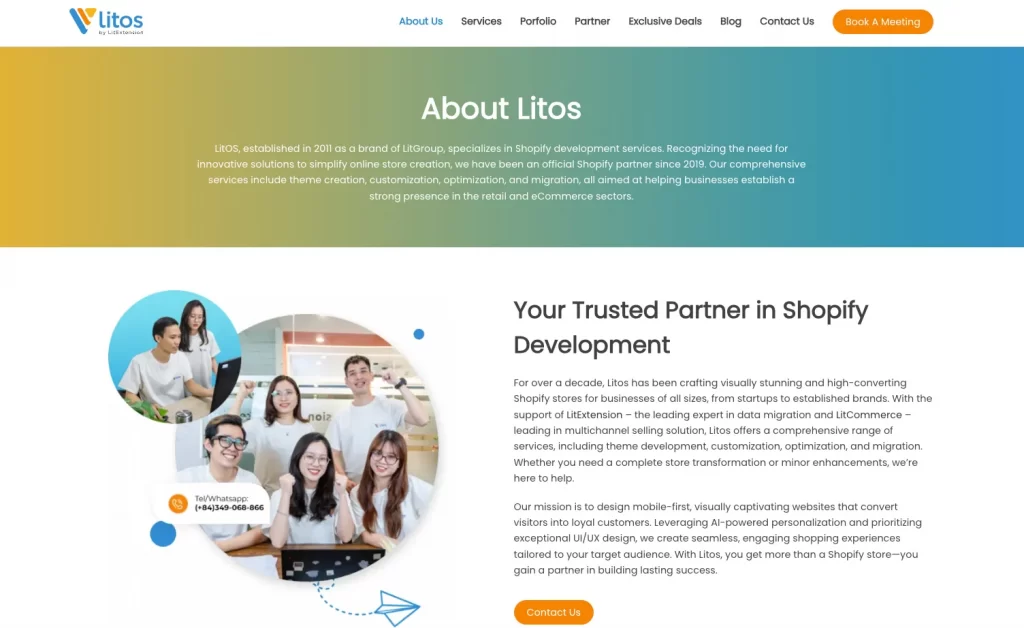
At Litos, we offer:
- Custom Shopify Store Development
- Shopify Plus Development
- Shopify Migration Services
- Third-Party App & API Integration
- And many more at Shopify Development Services!
Whether you’re launching, scaling, or optimizing your store, Litos.io provides the technical expertise and ongoing support to help you succeed.
Hire Shopify Developers: FAQs
1. How much does it cost to hire a Shopify developer?
Costs vary depending on the developer’s location, experience, and the project scope. Freelancers may charge between $25 to $100+ per hour, while agencies often offer project-based pricing starting from $1,500 to $15,000 or more. For ongoing support, monthly retainers typically range from $300 to $1,500+.
2. Is it worth it to hire a Shopify expert?
Yes—especially if you’re not confident handling technical tasks or want a professional-looking, high-performing store. Hiring an expert saves time, reduces errors, and ensures your store is built to support growth, user experience, and conversions.
3. How much does a Shopify expert cost?
Certified Shopify Experts generally charge higher rates than freelancers. Expect rates to start from $75–$150/hour, with full projects often priced above $5,000, depending on complexity. The higher cost often reflects better project management, communication, and results.
4. How much should it cost to build a Shopify website?
A basic store with a pre-built theme may cost $1,500–$3,000. Custom stores with advanced features, custom design, or app integrations can range from $5,000 to $15,000+. You should always request a detailed quote based on your requirements.
5. Do I need a Shopify developer?
If you’re building a custom store, adding complex features, integrating external systems, or simply want to avoid technical headaches, then yes. A developer can save you time and ensure your store is stable, optimized, and ready for the future.
6. Can I pay someone to build my Shopify store?
Absolutely. Many business owners choose to pay a freelancer or agency to handle their entire Shopify build. This ensures a faster launch and professional setup with fewer issues later.
7. When should you hire a Shopify developer?
The best time is either before launching your store or when you’re ready to upgrade, customize, or scale. If you’re planning a migration or experiencing performance issues, it’s also a good point to bring in expert help.
Final Thoughts
Building a successful online store requires more than just choosing a theme and adding products. If you want your Shopify store to look professional, perform well, and grow with your business, the smartest move is to hire Shopify developer who understands both the technical side and your long-term goals.
Whether you’re launching your first store, migrating from another platform, or customizing an existing setup, working with the right expert will save time, reduce errors, and unlock the full potential of Shopify.
Don’t settle for trial-and-error. Choose a developer who can bring your vision to life and build a strong foundation for your brand.Looking for someone reliable to get started? Litos.io is ready to help you hire Shopify developer that fits your needs, budget, and timeline.

